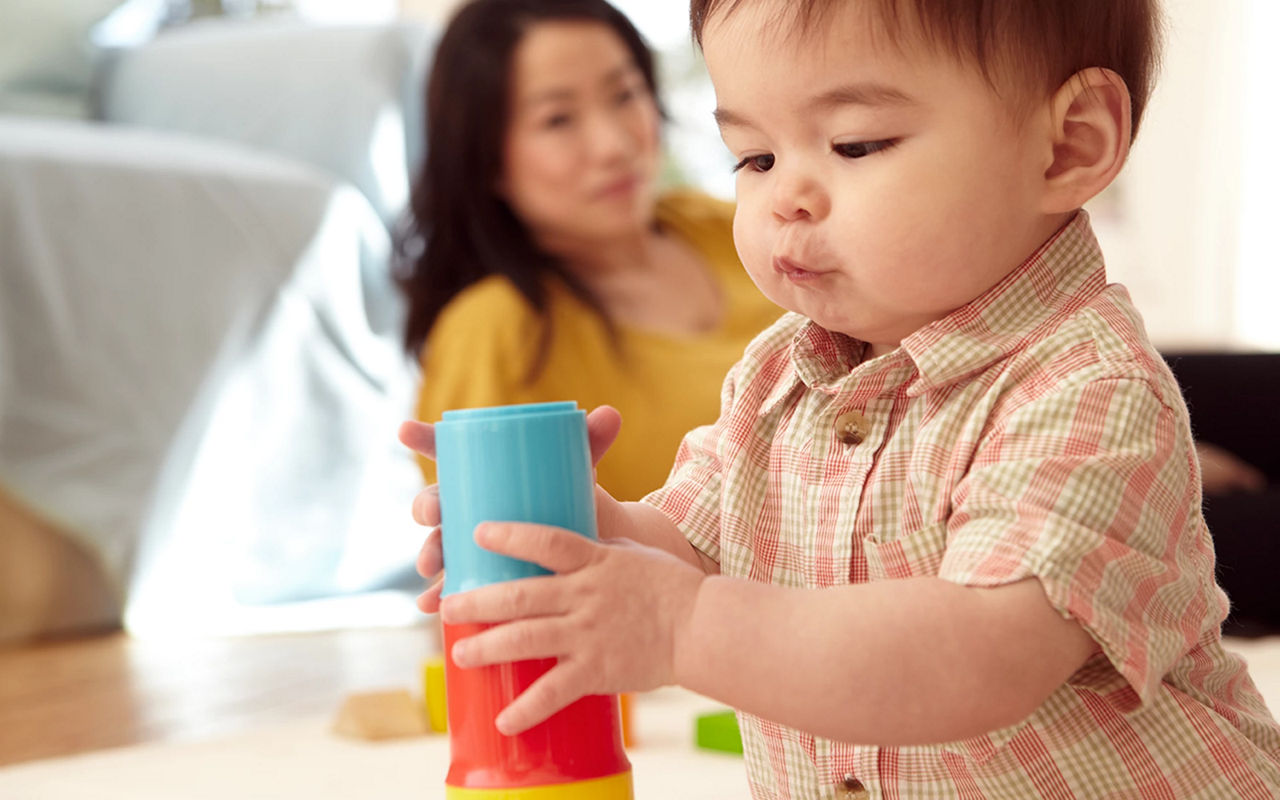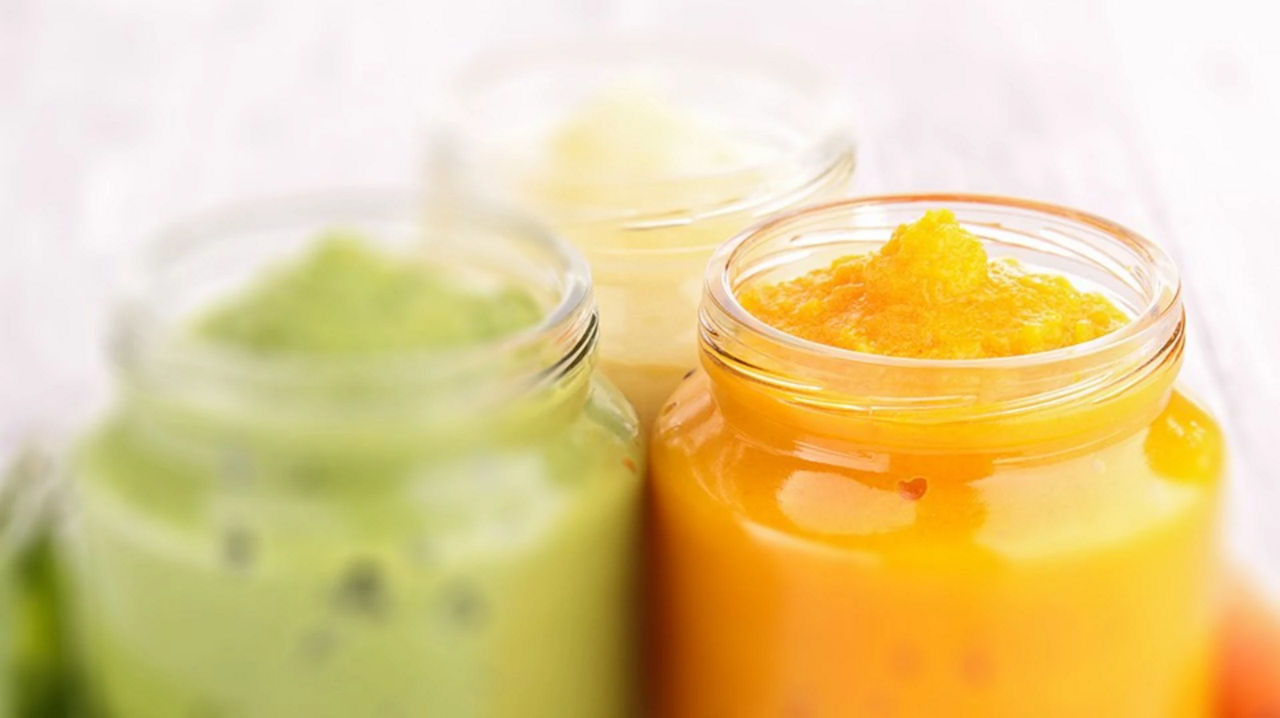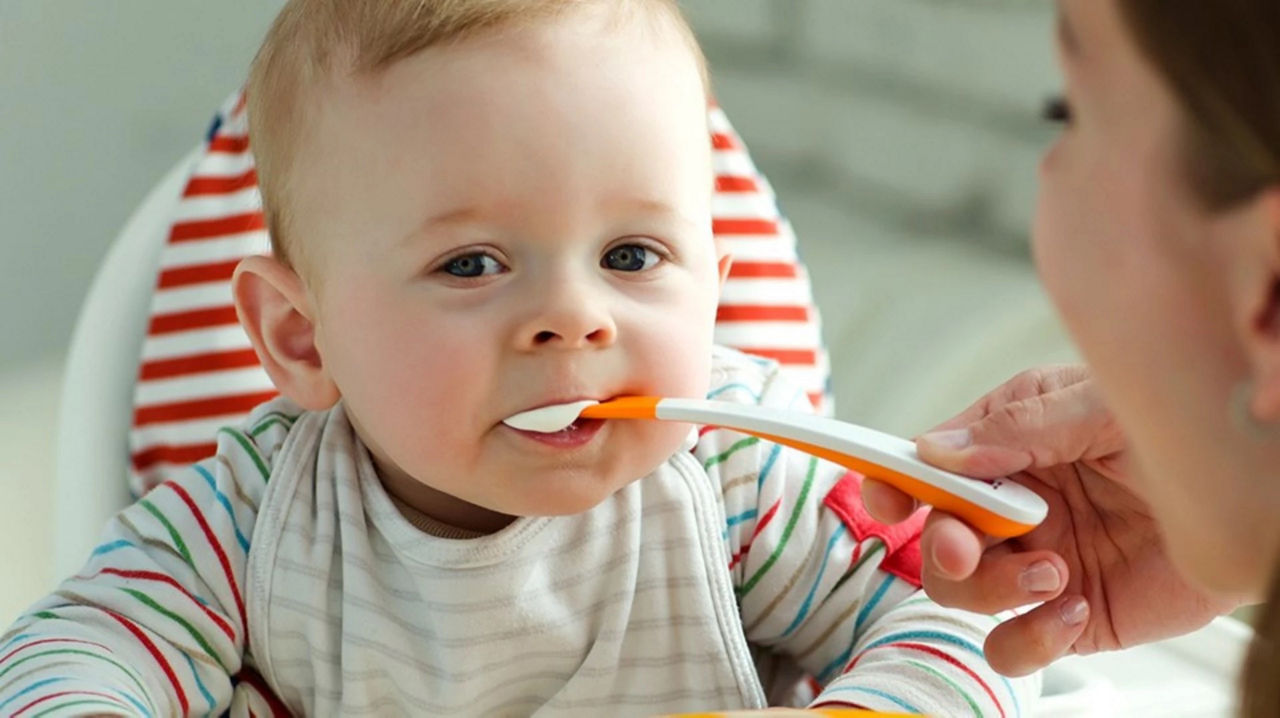Crawling, creeping or sliding along, at 7–9 months old, your increasingly mobile baby is making their first move towards walking. Their ability to gesture and say your name shows just how much their communication skills are improving. But it may be a while before they understand the meaning of ‘no’.
Your baby’s development at 7–9 months old
From foods to toys, they're keen to explore

What to expect in your baby’s 7th to 9th months
At 7–9 months, your baby’s growing awareness of the world around them makes everything an adventure. From pulling at curtains to finding their way into nooks and crannies, you may spend much of your time trying to keep them safe.
Asserting their preferences is a common part of a 7-month-old’s development, too, especially for a favourite toy or food. And while you may be keen for mealtimes to go smoothly, a varied weaning diet is key for providing the vitamins and minerals they need. Learn more about the importance of each nutrient in our article.
Your baby can also respond to your voice and even make an attempt at saying your name – although they may confuse ‘mama’ with ‘dada’.
And if you haven’t seen any signs of their first teeth yet, they will usually appear between now and nine months old. Drooling and irritable moods can both be signs of new teeth on the way.
Developing new ways to communicate
Gesturing is a significant development in your baby’s communication skills, and an important predecessor to language1. Instead of crying to be picked up, your baby may extend their arms and look up at you, or they may give you a sign that they want to be put down1.
 Putting a toy just out of their reach will encourage them to keep moving towards it, and help improve their mobility
Putting a toy just out of their reach will encourage them to keep moving towards it, and help improve their mobility
A baby’s unique personality and signs of independence are more apparent at around seven months.
Fine-tuning their motor skills
Your 7-month-old baby will be keen to get around – by whatever means they can manage! Some crawl, creep, slide or roll along, while others combine all four. Either way, putting a toy just out of their reach will encourage them to keep moving towards it, and help improve their mobility.
They may even be strong enough to hold themselves up on their legs with a little support, which is helpful preparation for learning to walk. The ability to hold and drink from a cup, and possibly eat from a spoon, makes for more independent mealtimes too.
Now they can sit unassisted and pick up toys, playtime is more independent that a few months ago.
Feeding your baby’s development
Iron remains an important nutrient for your 7–9-month-old’s brain development. In fact, at 7 months, they have almost the same iron requirements (per kilo of body weight) as a 30-year-old man. Iron-rich foods such as lean red meat, chicken, eggs, pulses and leafy, green vegetables, are an essential part of a healthy weaning diet. Fortified baby breakfast cereals are also an excellent source.
If you are bottlefeeding, you may wish to move on to a follow-on milk. Specially formulated to complement your baby's weaning diet, it can provide extra iron, vitamins and minerals, along with the benefits of LCPs, prebiotics and nucleotides. Research shows that two LCPs – particularly AA and DHA, found naturally in breast milk – are important for the development of a baby’s brain, eyes and nervous system.
Getting to grips with chewier textures
As you start to introduce new tastes and thicker textures, you may find it easier to incorporate a wider variety of iron-rich foods, such as oily fish, meat and dried fruits , in your 7–9-month-old baby’s diet. For more information on making baby food, introducing new foods and new textures, read our articles.
Giving your baby a spoon will help them learn to eat, and if they keep picking up food, it may be a sign they are ready to try feeding themselves. Although it can be messy, you may find they eat more this way.
Chewier textures help your baby’s speech muscles to develop.
Ways to stimulate their development
As your baby gains better control over their leg muscles, bouncing up and down on your lap or in a bouncer may provide endless fun. At this stage, a homemade playground, complete with throws or cushions, is perfect for strengthening their muscles as they shuffle around it. Remember to always stay close by to keep your baby safe as they begin to explore their surroundings with their newfound skills.
Helping your baby form words
Although not yet talking at 7 to 9 months old, your baby is beginning to recognise their own name and should soon turn around when they hear it.
Their random babbling will start to sound more like words as they repeat the sounds they have mastered. Talking, reading and singing to them can help them recognise sounds and copy them. Singing songs to your baby is a great way to stimulate their speech patterns and can encourage bonding and brain development.
Next steps
What to eat at 7–9 months checklist:
- Starchy foods – bread products, cereals, pasta, rice and potatoes. Offer one portion at each meal.
- Fruit and vegetables – fresh, frozen, tinned, or dried fruit and vegetables. Serve a variety at each meal.
- Dairy – cheese and yogurt are rich in protein and calcium.
- Meat, fish and alternatives – this group also includes eggs, tofu, and pulses, like peas, beans and lentils.
- Foods high in fat and sugar – oils, butter, cakes and biscuits all belong in this group. These are not suitable foods in the weaning diet except for small amounts of fats and oils in cooking and butter spread thinly on bread or toast.
- Salt – a baby’s developing kidneys cannot handle high salt intakes. The recommended maximum for babies is 1g of salt per day, which is a sixth of an adult's maximum daily allowance. To stay within safe limits, avoid adding salt to any food or meals you are preparing for your baby and don’t give them processed foods, which are often high in salt.
- Milk – between six and twelve months, babies should drink around 500–600ml of breast milk or formula a day.
related articles
Learn more about your baby

Need some help?
You can get quick answers to common questions in our FAQs.
Alternatively, if you need help with general pregnancy or baby advice, or maybe on using or ordering our products - our expert team are always on hand to talk about feeding your baby.
- Parenting. Month-by-month guide to baby's milestones [Online]. Available at: https://www.parents.com/baby/development/growth/baby-milestones-month/ [Accessed April 2014]
Last reviewed: 13th August 2014




